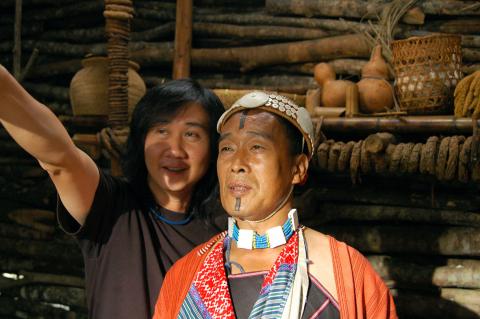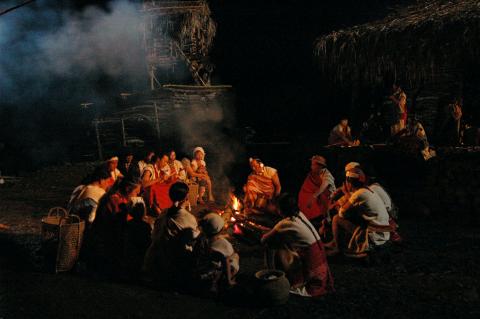Chen Wen-pin (陳文彬) weaves together ancient Atayal (泰雅族) tradition and modern-day social issues in his feature debut Everlasting Moments (靈魂的旅程). Shot mostly in Atayal and Pangcah (Amis) villages and casting locals who speak tribal languages, the film places present-day indigenous life in the context of the ancient migration of the Atayal community. The result is an eloquent reflection on the relationship between Aborigines and nature, and how that harmony can be destroyed by the state apparatus.
Documentary footage of Sanying Aboriginal Community (三鶯部落) and the now demolished Sa’owac Aboriginal Community (撒瓦知部落) on the banks of the Dahan River (大漢溪) shows real-life struggles that Aborigines face in a society dominated by Han Chinese.
Having worked as a social activist and a journalist, the 42-year-old Chen is no stranger to the social injustice and discrimination shown in Everlasting Moments. The idea for the film came about when he was asked to make Msgamil: Once Upon a Time (泰雅千年), a short film commissioned by the Shei-pa National Park Headquarters (雪霸國家公園管理處).

Photo Courtesy of Chen Wen-pin
Initially, the project focused on gaga, the set of ancient teachings and beliefs that the Atayal pass from one generation to the next. A deeper understanding of Aboriginal life and the relocation issues faced by Sanying, Sijhou (溪洲) and other urban Pangcah (the name the Amis use to refer to themselves) communities, however, prompted the director to expand the short work into a feature-length project in order to “rethink the relationship between humanity and nature.”
Chen spent more than a year traveling through most of the country’s Atayal communities before deciding to shoot the film in the villages of Singuang (新光) and Cinsbu (鎮西堡) in Hsinchu County, where he says the loss of the Atayal language and culture are less severe than in other places.
For the set, traditional Atayal structures were built by local residents after discussions with the Han Chinese film crew, and prior to shooting theater veteran Chung Chiao (鍾喬) led workshops to assist villagers — who became actors in the film — in discussing their personal histories and recalling memories “buried inside their bodies.” Several tribal elders worked on the set as language consultants. Chen said that even when the production crew thought that everything was ready, people might not show up because someone had a dream that was interpreted as a bad omen.

Photo courtesy of Chen Wen-pin
“To work with the tribespeople, we had to give up our own ideas and learn to see the world from their perspective,” said Chen, best known for his award-winning performance in No Puedo Vivir Sin Ti (aka Cannot Live Without You, 不能沒有你, 2009).
Chen also drew inspiration for Everlasting Moments from Atayal brothers and musicians Bulang Yukan (不浪尤幹) and Yuraw Yukan (尤勞尤幹), also an actor, whose works include Cheng Wen-tang’s (鄭文堂) Somewhere Over the Dreamland (夢幻部落) and Singing Chen’s (陳芯宜) God Man Dog (流浪神狗人).
Intrigued by the pair’s life stories, the director told his Atayal friends that he would one day write a story about them.

Photo Courtesy of Chen Wen-pin
One year later, Bulang Yukan passed away after falling from the stage while performing a concert in China. The Atayal I Don’t Remember (我所遺忘的泰雅), the last work the musician created, can be heard at the end of Chen’s film.
In Everlasting Moments, Yuraw Yukan plays both an ancient chief and a modern Aboriginal official.
The actor said that while he is usually cast as a drunk or vagabond in movies and television dramas, he feels he plays a real Atayal in Chen’s work.
“Garbed in traditional clothes and painted with facial tattoos, I walked through the mountains, breathed the air and actually felt that the ancestral spirits were around me,” Yuraw Yukan told the Taipei Times.
The film is not without controversy.
Questions are raised in Atayal director Pilin Yabu’s (比令亞布) The Moment Run Through (走過千年), which documents the making of Chen’s Msgamil, the forerunner of Everlasting Moments. According to Yabu’s film, the Han Chinese film crew entered the Atayal communities with the aim of collaborating with the inhabitants, but failed to earn the trust of all the tribespeople, leaving some feeling they had been lied to and used.
The Moment Run Through DVD can be purchased online at www.govbooks.com.tw or www.books.com.tw.

Towering high above Taiwan’s capital city at 508 meters, Taipei 101 dominates the skyline. The earthquake-proof skyscraper of steel and glass has captured the imagination of professional rock climber Alex Honnold for more than a decade. Tomorrow morning, he will climb it in his signature free solo style — without ropes or protective equipment. And Netflix will broadcast it — live. The event’s announcement has drawn both excitement and trepidation, as well as some concerns over the ethical implications of attempting such a high-risk endeavor on live broadcast. Many have questioned Honnold’s desire to continues his free-solo climbs now that he’s a

Lines between cop and criminal get murky in Joe Carnahan’s The Rip, a crime thriller set across one foggy Miami night, starring Matt Damon and Ben Affleck. Damon and Affleck, of course, are so closely associated with Boston — most recently they produced the 2024 heist movie The Instigators there — that a detour to South Florida puts them, a little awkwardly, in an entirely different movie landscape. This is Miami Vice territory or Elmore Leonard Land, not Southie or The Town. In The Rip, they play Miami narcotics officers who come upon a cartel stash house that Lt. Dane Dumars (Damon)

Francis William White, an Englishman who late in the 1860s served as Commissioner of the Imperial Customs Service in Tainan, published the tale of a jaunt he took one winter in 1868: A visit to the interior of south Formosa (1870). White’s journey took him into the mountains, where he mused on the difficult terrain and the ease with which his little group could be ambushed in the crags and dense vegetation. At one point he stays at the house of a local near a stream on the border of indigenous territory: “Their matchlocks, which were kept in excellent order,

Today Taiwanese accept as legitimate government control of many aspects of land use. That legitimacy hides in plain sight the way the system of authoritarian land grabs that favored big firms in the developmentalist era has given way to a government land grab system that favors big developers in the modern democratic era. Articles 142 and 143 of the Republic of China (ROC) Constitution form the basis of that control. They incorporate the thinking of Sun Yat-sen (孫逸仙) in considering the problems of land in China. Article 143 states: “All land within the territory of the Republic of China shall